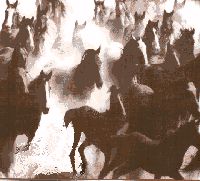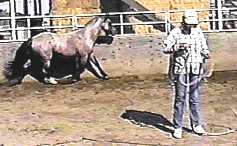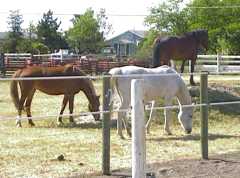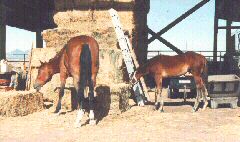Why Horses Blow Up |
Blowing off some Stress |
|
We constantly receive comments from discouraged owners of troubled,
formerly abused or wild horses that their training approaches seemed to be going so
well, then the horse suddenly lost all his composure. Oftentimes their
first assumption is that they did something terribly wrong or that the
horse had some kind of psychosis or other significant behavior problem.
In most cases the reality is that these horses are simply blowing off stress. It's something that a horse sometimes just has to do. Once the handler understands the process as well as the signs that the horse will likely exhibit that a stress release is imminent, this stress can be released safely and not devastate the gentling or training process. |
Most mammals have two functionally distinctive brain hemispheres. In short, the left hemisphere (left brain) is the logically cognitive, interactive and communicative "thinking" center. The right hemisphere (right brain) is the center of emotions and autoresponsiveness ("feeling" and reactivity.) We humans are constantly exercising both sides of our brains, however over time our left brain has become very dominant and we flourish through logical reasoning, cunning and intelligence. It often takes intensive training and conditioning for us to develop our right brains to the point that we possess highly responsive cat-like instincts. Being prey animals, horses have survived by relying most heavily on their "right brain." They have to automatically react and respond to danger without hesitation for when predators are on the prowl, the last horse out is dinner. Horses are also designed with poor synchronization between the halves of their brains. While their left brains may be active as they interact with other herd members, explore for a better morsel of food, etc., their right brain has to independently remain on high alert and trigger an immediate flight response when stimulated. In herd situations, all the horses don't stay on alert 100% of the time. They take turns relaxing and depending on others to keep watch for danger, lowering their own alarm thresholds and letting the herd "sentries" be the primary triggers for their flight responses. The horse trainer and handler must understand these characteristics. Horses under stress will likely react. If the handler gains the horse's confidence, the horse will divest itself of some of its emotional triggers. It's up to us to understand why a horse can get nervous and/or panic, and how we can gain the horse's trust and desensitize his alarm center while in our presence. In this feature we'll discuss some theories about horse emotions and how to deal with them.
Continue to Part 2 |

The lead mare looking out for the group
| ||
Press "Back" to return to the page that brought you hereGo to Case Study SectionReturn to Training SectionReturn to Wild Horse MentorsReturn to KBR World of Wild Horses and BurrosGo To
| |||




